
born Aug. 3, 1908, Bento Gonçalves, Brazil
died Sept. 12, 1996, Rio de Janeiro
army general who was president of Brazil from 1974 to 1979.
A career army officer, Geisel joined the military coup led by Getúlio Vargas that overthrew the elected government and installed a dictatorship in 1930. Geisel supported Vargas for 15 years, serving in a variety of military and civil administrative posts, but in 1945 he played an important part in overthrowing Vargas' government. Over the course of the next 15 years he held several important offices, including deputy chief of the military staff of the presidency and military representative to the National Petroleum Council, gaining a reputation for incisive leadership. He participated in the military coup of 1964 and became chief of President Humberto Castelo Branco's military staff. In 1969 Geisel took charge of Petrobrás, the national oil corporation, expanding its scope and increasing production dramatically.
Placed in the presidency by the military oligarchy (March 15, 1974), Geisel risked their opposition by beginning a gradual liberalization and demilitarization of the government, permitting open legislative elections in 1974, meeting with opposition leaders, and relaxing censorship. He outlined a new economic policy, “pragmatic nationalism,” which called for shifting emphasis from exports to the development of domestic industry, such as mining, agriculture, and transportation networks. Although there had been some indication that he might be succeeded by an elected civilian president, Geisel and his conservative supporters saw that they would be defeated in open elections. Accordingly, Geisel took no further steps toward democratization, and official repression of the political opposition increased in 1977. Geisel did not run for reelection in 1979 but instead supported General João Baptista de Oliveira Figueiredo, his successor.

No comments:
Post a Comment